One of the challenges in teaching or talking about survival is in being realistic. We all tend to approach the subject with specific pre-determined scenarios, almost all of which can cause us to limit the various problems we might have to deal with in that scenario. While that isn’t a problem if we create multiple plans that cover all possibilities, it is too easy to leave something out of our thinking.
One such way that we leave something out of our scenarios is how we think of the weather. I have found that in most survival scenarios, people ignore the weather entirely, even though some of the things we might have to survive are pretty literally weather events, like hurricanes. Another way we do this is to set our scenarios in the summertime. In doing so, we ignore, or at least minimize, the problems that winter can bring.
Winter survival doesn’t just mean dealing with the cold, although that is an essential part of it; it also means dealing with a lack of resources. Throughout history, societies worldwide had to prepare supplies for winter, much like a squirrel stashing away nuts. Failure to make those preparations was fatal, as the possibility of finding food was all but impossible. Animals hole up in the wintertime, making them harder to hunt, and edible plants die off or go dormant till things warm up in the springtime.
Surviving in the winter either means having the necessary supplies already stockpiled in the warmer months or finding alternative ways of coming up with the supplies needed. It doesn’t matter if we’re talking about an urban, rural, or wilderness survival situation. We will be faced with those same challenges.
Click HERE to Get the World’s Smallest Battery,
That Powers Your House For More Than 2 Days!
Of course, winter varies depending on how far north one is. Wintertime temperatures vary considerably, depending on both latitude and altitude. What passes for winter in some parts of the country is nothing more than a cool spring day in others. But for the sake of this article, we’re talking about a winter scenario that’s cold enough to freeze water and where there is a considerable amount of snow on the ground.
Preparing for Winter Survival
To a large part, preparing for winter survival is no different than prepping in general. Still, the fact that we’re dealing with cold and snow makes a few differences, especially if we’re talking about wilderness survival. We can’t make the mistake of not stockpiling enough in the wintertime and expect to go out and find what we don’t have. Even if we can find it, doing so will require a lot more effort; I might add that that will need a significant draw on our available energy.
It is widely understood that maintaining our body heat is our number one survival priority, other than having oxygen-laden air to breathe. While this is true any time of the year, it becomes our overall obsession with winter cold. The inability to keep ourselves warm can kill us, regardless of how well we are prepared in other ways.
Clothing
There are several things we need to make sure that we have to keep warm. The first of these is adequate warm clothing. Clothing is our body’s first line of defense against the cold, something that modern man seems to have forgotten. We tend to depend on heating our homes to keep us warm. That’s okay as far as it goes, but we still need to stay warm when there is no heat.
A large part of the issue here applies more to women than it does to men. The styles of clothing that we buy for ourselves may not be appropriate for keeping ourselves warm. No matter how good it looks, a short jacket isn’t going to keep the wearer as warm as a long one. Nor are tight-fitting jeans going to keep that person as warm as jeans that are loose enough to allow for wearing thermal underwear underneath them. There’s nothing wrong with owning fashionable clothing, only depending on that trendy clothing as our go-to in a survival situation. We’ve got to make sure that we have warm clothing too.
The best warm clothing is that which can be worn in layers. As temperatures adjust and we become more active, it may become necessary to remove some clothing to prevent ourselves from becoming too warm. Ideally, we should be wearing just enough clothing to keep us warm, without wearing so much that we become hot and begin to sweat.
Waterproof boots are another critical clothing item that is usually lacking. Those who hunt might have warm waterproof boots, but few others do. We don’t worry about our feet getting cold because we can always warm them up when we get back indoors. Yet if our feet get cold enough, we can find ourselves in a situation where they become so numb that we can’t even walk.
Fuel
Another significant error I see preppers make is in not having enough fuel for heating. Most of us count on heating with wood, which makes sense. Wood has been used for all of human history as a source of heat. It is a renewable resource, which we can harvest with minimal tools and special knowledge. Even so, most preppers I’ve seen don’t have more than a cord of wood to heat with; and that may very well be pine.
People who regularly heat their homes with wood go through four to six cords of wood per winter, and that’s good hardwood, not pine. Hardwoods hold much more chemical energy that can be released in the form of heat when burning. While pine helps start a fire, it burns too quickly for use as the primary heat source.
The other big problem most of us face is a ready way of replenishing our fuel supply, especially in a long-term survival situation. With the basic assumption that there won’t be any fuel available for our vehicles, how are we going to get to somewhere where we can cut more firewood for the following year, let alone haul that cut wood back home? That was accomplished mainly by horse or oxen-drawn wagons in the past, something that we don’t have available to us today.
Nor do most of us live close to a convenient forest, where we can go to chop wood. Some people living in rural areas might have that available to them, but the vast majority of the population doesn’t. We can’t expect to cut down the trees in the neighborhood park either because those who are unprepared will beat us to it, as they will with scavenging just about anything else that’s flammable.
When in the wild, always gather considerably more fuel than you think you’ll need. You will go through more firewood on a cold night than you would go through on a warm one, and you don’t want to be searching for more firewood in the dark.
Living Space
Assuming that you have a wood-burning stove in your home, I seriously doubt that it’s able to heat your whole house. The heat from a wood-burning stove radiates into the air around it, limiting its effectiveness to the room it is in. Without some means of moving that heat into other rooms, like fans, that one room is all that it’s going to heat, no matter how big the wood-burning stove is.
If we go back in history to the pioneering days, most homes were one large room with a loft. That allowed one fire to heat the entire home. If rooms were added on, the first would be a kitchen, which would fire for heat. Heating bedrooms was problematic, as that would require building another fireplace or buying another wood-burning stove. That option was only available to those who were very well off, financially speaking.
Have you tested out your wood-burning stove or fireplace to see just how much of your house it will heat? Have you looked at how your entire family can live and especially sleep in that one room? Have you considered taking down a wall or two, modifying your home to an open living concept, so that the heat from your fire can heat a larger amount of space, giving you more space to live in if that fire becomes your only heat source?
Our Bug Out Bags
The other thing we need to look at is our bug-out bags. I rarely see even one change of clothing included in a bug-out pack. Nor do I see hats, gloves, scarves, coats, or boots. While I think we can safely assume that people will change into warm clothes before leaving, what will they do if the weather turns much worse than it was when they went home?
This is where dressing in layers is essential. People who spend a lot of time involved in outdoor winter activities already know the value of dressing in layers. They will always have more layers that they can put on and layers they can take off. In the fall, we need to revamp our bug-out bags to reflect this means of dressing if we have to bug out in the wintertime.
Avoiding Hypothermia
Regardless of whether we’re talking about bugging in or surviving in the wilderness, the primary key to winter survival is avoiding hypothermia. Several vital things need to be accomplished for that to happen:
- Wear enough clothing to keep us warm
- Avoid getting so warm that we begin to sweat
- Avoid getting wet
- Eat enough food to ensure our bodies have the energy to burn and create heat
Shelter helps in providing us with an area that we can heat, giving ourselves an environment warmer than the ambient air temperature. It also helps to protect us from wind and rain. Doing so keeps the wind from drawing our body heat away from us, but the more important thing is that shelter can keep us from getting wet.
Most cases of hypothermia involve people getting wet. It is still the same whether it comes from falling in the water, rain, or sweating. All of those situations need to be avoided. If we become wet, or even worse, our clothing becomes wet, we lose body heat much faster than if we are dry. Depending on the clothing we are wearing, if the dress is wet, we lose body heat over 300 times faster than if we were naked.
Once again, part of this is dressing in layers so that we can remove layers if we are active enough to cause our bodies to sweat. Even a little bit of sweat is too much, as it makes our clothing wet and has the potential of freezing against our skin when we stop doing that strenuous activity.
Whenever we are in cold weather, we must have a change of clothing available to us and a towel to dry off. That clothing should be as warm as what we are wearing. If we become wet, such as falling through the ice while crossing a river, we must immediately take off the wet clothing, dry it off, and put on the dry change of clothing.
Some might think it would make more sense to get into someplace dry and warm before changing clothes, but that’s not true. Taking the time to get into a warm shelter, even if that shelter is only 100 feet away, might mean that hypothermia sets in before we get there, impeding our cognitive ability and causing us to walk right by that shelter without even recognizing that we should go inside. We’ll continue walking until we lose the ability to control our bodies and fall.
Shelter in the Wild
The need for shelter cannot be overstated. But there’s a vast difference in the shelter needed in the woods in the winter than in the summertime. In addition to keeping the snow off you and blocking the wind, that shelter needs to help retain the heat from your fire. To make that possible, it’s essential to put a heat reflector behind the fire and add a windbreak if needed. If conifers of some sort are available, cover the shelter with layers of pine boughs, providing both insulation and a barrier against the snow.
Winter survival is where rescue blankets are the most valuable. Cover your shelter with them on the outside of the pine boughs to reflect the heat into your shelter. You can also use one behind the heat reflector, increasing the effectiveness of whatever you’re using as a reflector. Just be sure to keep it away from the fire, as Mylar melts at 250 degrees, much lower than the temperature of your fire.
Starting Fire in the Wintertime
The other big issue in the wintertime is starting fires. While fire starting is an essential survival skill, few of us practice it under less than ideal circumstances. Yet the combination of cold and wet we have in the winter make it harder to start a fire.
There is a lamentable tendency to think that we start a fire by applying fire to fuel, when in fact, what we are doing is applying heat to that fuel. Understanding that slight difference is critical, as fire starting techniques that only provide heat, such as any sparking device or friction method of starting a fire, will require more effort to use than they would in good weather. That’s not to say that they won’t work; it just means that you will have to put more effort into using them.
I prefer using more secure methods. My go-to fire starter is a stormproof lighter, and my backup is stormproof matches. I don’t even try starting a fire in cold or wet weather without using something as an accelerant, either cotton balls soaked in petroleum jelly, commercial fire starters, or one that I make out of black powder and nail polish remover.
The black powder fire accelerant (fire starter) recipe uses FFFFg black powder, the finest ground version. A couple of tablespoons are put in a bowl and covered with nail polish remover. Be sure to use the type that has acetone in it. Allow this mixture to sit for a couple of minutes and then pour off the excess nail polish remover. The remaining mixture should be scooped out of the bowl; it will have a consistency something like putty. Knead it, folding it over at least 50 times in the process, creating a series of layers. These layers are critical as they control the burn rate of the accelerant, keeping the black powder from burning off too quickly. If the putty starts to dry while kneading, dip it in more nail polish remover and continue kneading it.
This fire accelerant needs to be kept in an airtight container until it is time to use it, as the acetone will evaporate out of it reasonably quickly. When it is time to use it, set it on a bed of tinder, with kindling overhead. It can be ignited with just a spark and burn for roughly three minutes, at about 450 degrees. That’s long enough and hot enough to dry damp fuel and get the fire going.
Finding dry wood can be challenging in the wild. The best places to look are the underside of deadfalls, in thickets where snow doesn’t gather, or anyplace where there is enough of an overhang to protect deadfall limbs from getting snowed on. Avoid wood touching the ground, as it will likely have picked up moisture from the ground.
Since we’re talking about the winter, the limbs of trees will be relatively dry. During the fall, the sap from the trees migrates down into the roots, where it stays until springtime. So even though the wood is still considered “green wood,” it is much drier than it would be if cut during the summertime. While it will probably still be too wet for fire-starting, it can be used once dryer wood is used to get the fire going.


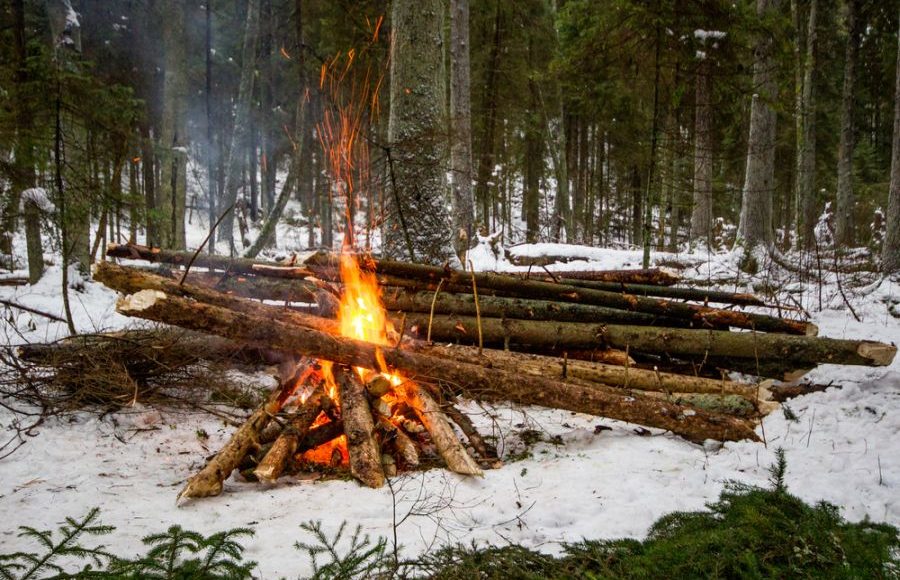
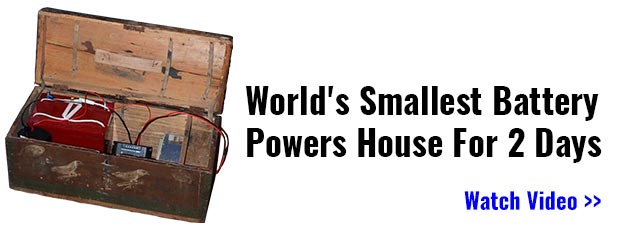
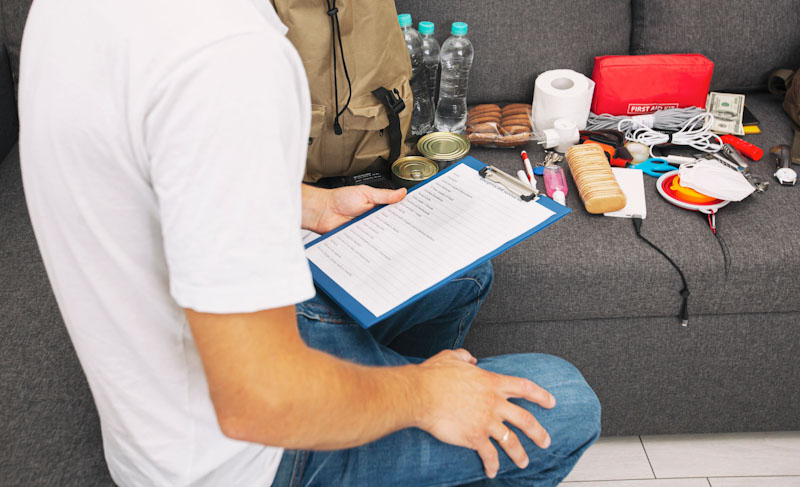
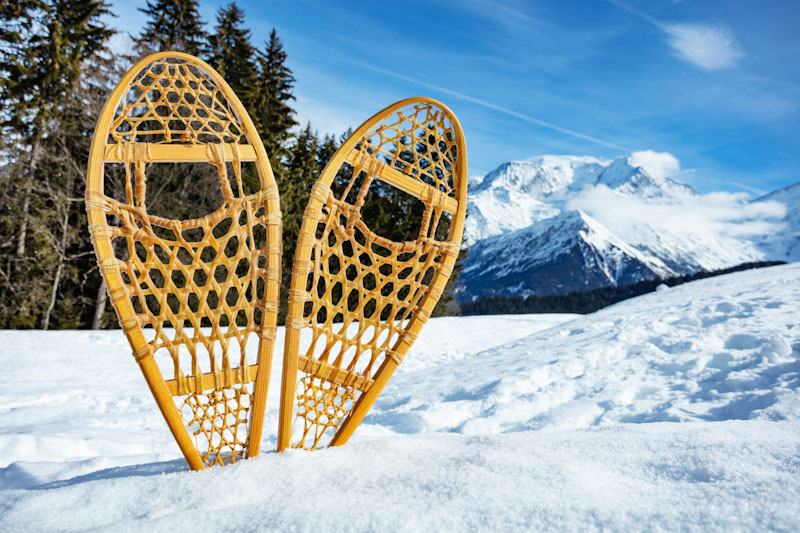
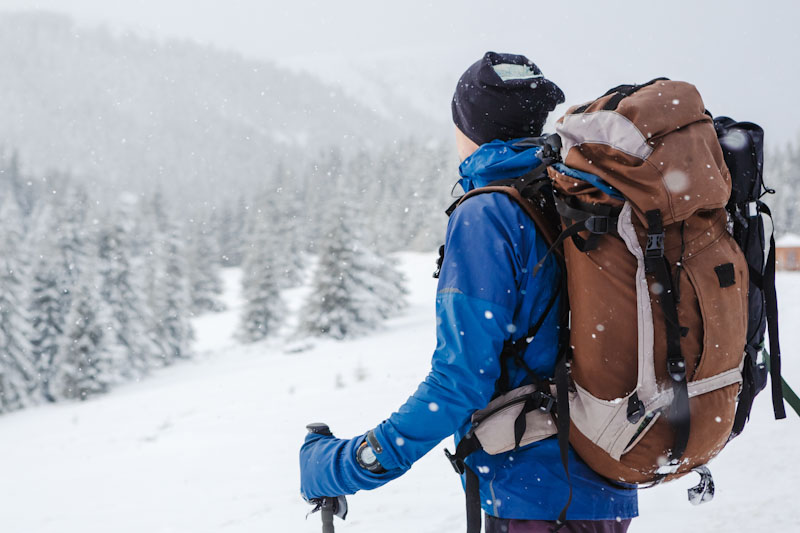



Jeff lantis | December 21, 2021
|
I enjoy reading your comments.